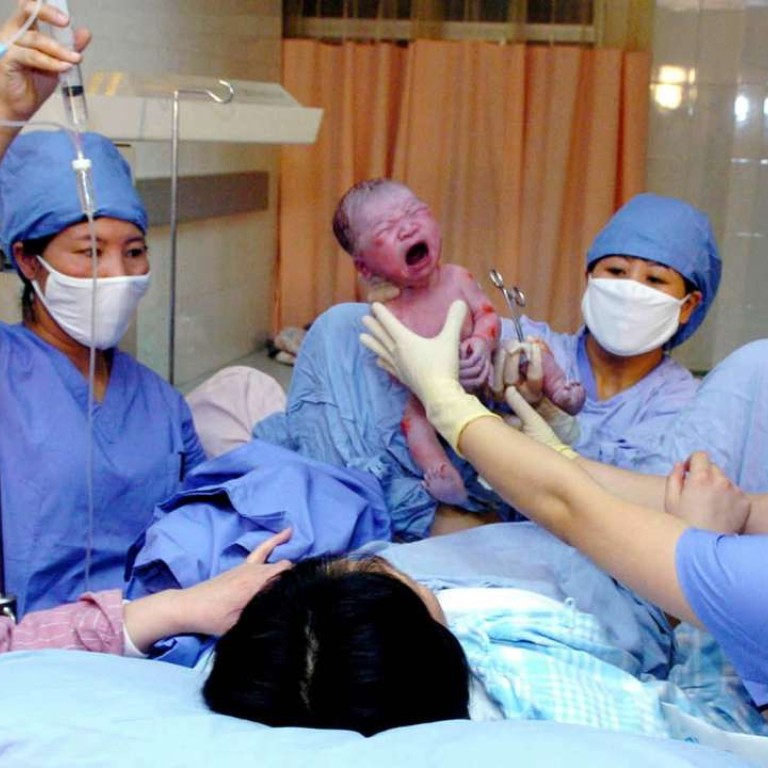
China’s big baby bump puts the squeeze on hospitals and pregnant women
Relaxation of the one-child policy is increasing competition for delivery spots in the country’s major cities
Jane Liang sits in the packed and noisy waiting hall of the Beijing Women and Children’s Hospital but the din doesn’t annoy her. Instead, she feels extremely lucky.
The 29-year-old accountant will be one of a select group to give birth at the centre when her time comes.
She secured the position when she thought she was eight weeks pregnant; others were already too late when they applied at six weeks.
My husband could not make an appointment even when he came to queue before 6am. Then we paid a scalper for an appointment
“My husband could not make an appointment even when he came to queue before 6am. Then we paid a scalper for an appointment. Luck struck again when the ultrasound scan showed my baby was only six weeks old,” Liang said.
The doctor then booked her a bed in the month after the estimated due date because all the delivery rooms for women at her stage of pregnancy had already been snapped up.
The scarcity of beds is in sharp contrast to just a few years ago when a pregnant woman could book at bed after 12 weeks.
While demographers still assess the effects on population from the full relaxation of the one-child policy announced last year, pregnant women are feeling the squeeze.
China forecasts that an extra 17 million babies will be born throughout the country within the next five years due to the policy change. In some of those years, there are expected to be more than 20 million births.
With this year the year of the monkey, traditionally considered an auspicious year for giving birth, the competition for a bed is even fiercer.
Beijing recorded 200,000 births last year, but the number is expected to hit up to 360,000 this year, well above the hospital system’s capacity to handle 260,000 to 280,000 births.
Geng Yutian, deputy director of the Beijing Health and Family Planning Commission, said there had been a surge in pregnancies this year, with an average of 30,000 each month, compared with only about 20,000 per month last year.
In August several top-level public hospitals notified the public that they were taking no more bookings for delivery in April.
Liang said some of her co-workers were too late to get in.
“You can never be too early, or you won’t get a bed in public hospitals. Two of my colleagues had to book beds in private hospitals after being turned down by several hospitals,” she said.
Beijing unfazed by drop in births despite ending the one-child policy
Yuan Juanjuan, 27, was armed with pregnancy kits so she would know as soon as possible if she had conceived and could launch her quest for a bed.
After failing to get one in three top hospitals when she was seven weeks pregnant, she tried her luck at a lower-level one.
She booked a doctor and was told, if the ultrasound showed a live fetus, she would get a bed.
“It’s not too bad. I got a place after all. This is the hospital where my father and I were born. It’s a good hospital to give birth in if I don’t have any complications during pregnancy,” she said.
Amid the huge pressure for beds and on personnel, the commission has ordered public hospitals under the municipal government to abolish “special needs wards” – where parents can pay for better service and private wards – to make room for more expectant mothers.
Some public hospitals are also renting space and hiring staff to expand maternity services, together adding up to 1,000 more beds.
Fears over Chinese school staff shortages as women teachers opt for second baby after end of one-child policy
Fudan University demography professor Ren Yuan said the increase in pregnancies showed the relaxation of the birth control policy was having an impact, especially in big cities such as Beijing and Shanghai with many migrants.
But he did not expect to there to be a big bounce overall in fertility.
Even taking the extra monkey year births and policy factors into consideration, the fertility rate in China remains low
“Even taking the extra monkey year births and policy factors into consideration, the fertility rate in China remains low. The increase was not much given the base of 16 million babies born each year,” Ren said.
The bump in babies would not change the population structure in the near future, he said, but might slow society’s ageing a little in the long run.

